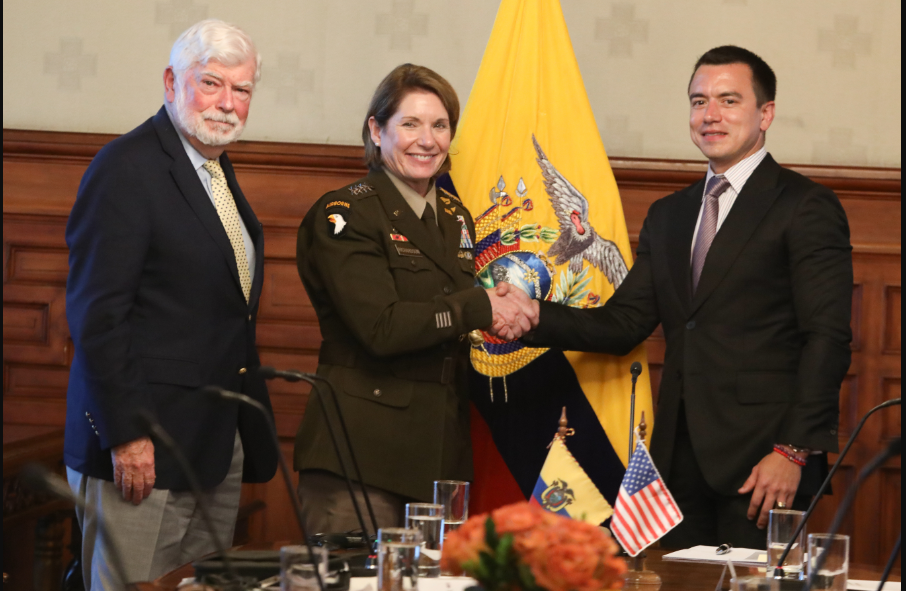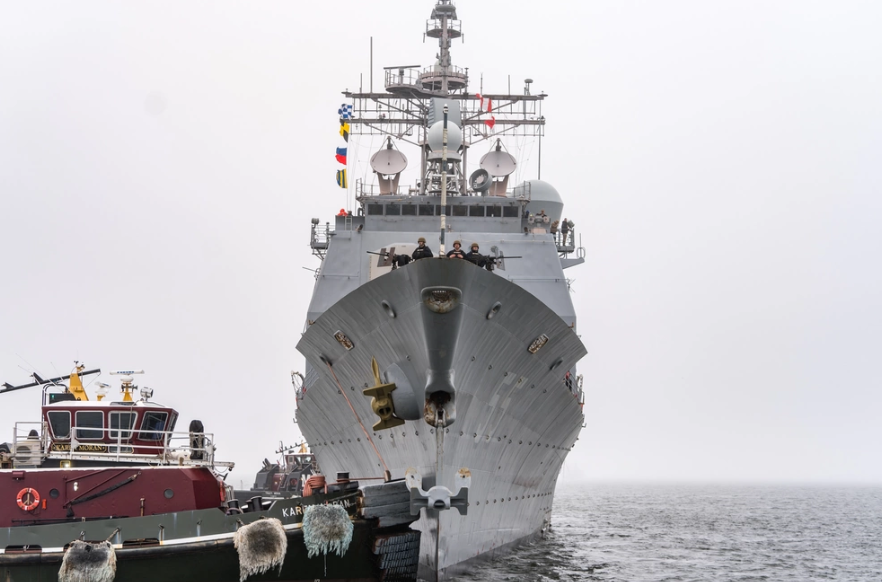
by D. Kortekaas
On January 28, the Ticonderoga-class guided-missile cruiser USS Leyte Gulf sailed out of Naval Station Norfolk, Va., to the 4th Fleet area of operations, which includes the Caribbean and Central and South America.
The mission of the Leyte Gulf and its crew of more than 40 officers and more than 350 enlisted sailors is “to help keep illegal drugs from U.S. and partner nations’ shores…”

One of those partner nations is beautiful, heretofore peaceful and prospering Ecuador.
Ecuador has recently experienced unprecedented and appalling levels of crime and violence. Most of it brought about by brazen, drug-financed criminal gangs and organizations, fueled by narco-criminal elements’ “push to find new drug trafficking routes to the United States and Europe.”
.
In response to the violence, newly elected Ecuador President Daniel Noboa declared a nationwide state of emergency, announced the existence of an “internal armed conflict” and authorized military action against organized criminal gangs across Ecuador.
On January 16, Noboa said that Ecuador is the most recent frontline of a global problem and needs international assistance.
“I would gladly accept the cooperation of the United States. We need equipment, we need weapons, we need intelligence and I think this is a global problem. It is not just in Ecuador,” he told CNN.
The United States condemned the violence and pledged to provide assistance, as it is not only in its own interest to have strong, democratic, prosperous neighbors to the south, but also because a sizable portion of the drugs eventually enters the U.S.
Additionally, poverty, crime and violence in Central and South America contribute to the serious migration crisis at the U.S.-Mexico border.
The departure of the Leyte Gulf — “to conduct passing exercises with regional partners and make port visits to counter threats such as illegal drug trafficking” — is just one of the early signs of concrete support by the U.S. to its partner in crisis.
The week of Jan. 22-25, a high-level U.S. delegation led by Special Presidential Advisor for the Americas Christopher Dodd, visited Ecuador and met with President Noboa and other senior Ecuadorian leaders.
Focus of the meetings was strengthening U.S. cooperation and assistance. More specifically to bolster Ecuador’s efforts to combat transnational criminal organizations in the wake of the recent surge in violence.
An important and very visible part of the delegation was U.S. Army Gen. Laura Richardson, commander of U.S. Southern Command (SOUTHCOM).
General Richardson is no stranger to Ecuador.
In September 2022, General Richardson, joined defense leaders from 10 nations in Quito, Ecuador, to discuss security challenges and regional cooperation. She also met with then-President Lasso.
Already then, General Richardson warned about criminal organizations “poisoning our people with drugs and stretching their tentacles of violence and corruption across the region.”
Ecuador’s Minister of Defense at the time, Gen. Luis Eduardo Lara Jaramillo, similarly warned:
It’s getting ever more urgent to find effective cooperation mechanisms…especially against the assault of narco-trafficking, transnational criminal organizations, and subversion that seriously threaten not only the peace and security of nations, but also the very existence of [nation] states.
A White House statement released at the beginning of General Richardson’s most recent visit to Quito promised, among other:
• The delivery of over 20,000 bullet proof vests and more than $1 million worth of critical security and emergency response equipment..
• An increase in in-country FBI to support the Ecuadorian National Police and Attorney General’s Office.
• The deployment of Homeland Security personnel to support the ongoing training of the police and prosecutors.
• Additional support in digital forensics and other analysis critical to targeting gang members, drug trafficking networks, and corrupt officials.
On the last day of her official visit, General Richardson met with men and women serving in the Ecuadorian Armed Forces in Guayaquil. On the occasion, the United States donated security assistance vehicles and equipment to strengthen Ecuador’s law enforcement, military and disaster response institutions.
A SOUTHCOM press release on General Richardson’s meetings concludes with the words, “The U.S. is committed to supporting the security of the Ecuadorian people.”
And indeed, such a commitment is in good hands with the storied Southern Command.
Located in Doral, Fla., SOUTHCOM is one of 11 unified Combatant Commands in the Department of Defense It is a descendant of U.S. military units dispatched to Panama in the early 20th century.
Today, SOUTHCOM has more than 1,200 military and civilian personnel representing the Army, Navy, Air Force, Marine Corps, Coast Guard, and several other federal agencies ready to ensure the stability of the Western Hemisphere.
Richardson, a decorated Army combat aviator, the second woman to attain the four-star rank in the U.S. Army, as well as the third woman to lead a combatant command, often calls her area of responsibility “our shared neighborhood.”
A neighborhood that is “under assault from a host of crosscutting, transboundary challenges that directly threaten our homeland,” Richardson has said in the past.
Today, more than ever, a member of that neighborhood, Ecuador, is relying on support from its neighbor to the north.
That support is on its way, spearheaded by the U.S. Southern Command.
















